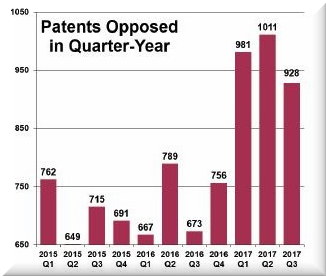

THE quality of patents at the Office of Benoît Battistelli is as high as the quality of the lies of Benoît Battistelli.
epo.org link). It was promoted in the Organisation's Twitter account some hours ago. "In a new blog post President Battistelli reviews 2017 and discusses the year ahead with a strong focus on quality," it says. They too are lying. Yes, the Organisation. Does Herrnst care at all? Probably not because a few months ago he help defend the same lies about patent quality (in a private event that was publicly reported on). We suppose that a rebuttal to these lies is in order because staff must have noticed these lies. Someone ought to respond to the lies.
"He chairs a meeting in which to discuss himself."Battistelli is (of course) lying. He chairs a meeting in which to discuss himself. How ludicrous is that? Napoleonic. "At the beginning of December," he wrote, "I chaired our annual Quality Review, comprised of senior EPO management who are integral to maintaining and developing the Office’s quality."
So Battistelli controls everything, even things that are tasked with assessing his performance. Amazing, isn't it? Not at the EPO anyway; this has become the norm and something to be perpetually expected.
Is anyone out there surprised about it? Battistelli is moving his lips again, having returned from his (longer than other staff's) break. His lips utter words, which leave an odorous puddle of lies afoot.
"Battistelli is moving his lips again, having returned from his (longer than other staff's) break."Let's look at the latest evidence of a decline in patent quality (as the EPO itself is unable to safely investigate the matter; staff representatives who merely brought up the subject were severely reprimanded by two Vice-Presidents). Introspection verboten!
The EPO's Patent Prosecution Highway (PPH) with Canada, which we mentioned on Tuesday morning, is now officially "news" (several days after it actually started). It comes from two publications that typically parrot EPO press releases [1, 2]. The first says this:
The European Patent Office (EPO) and the Canadian Intellectual Property Office (CIPO) have extended a patent prosecution highway (PPH) pilot agreement.
The extension of the pilot, which allows applicants who have been successful in obtaining a patent at one office to request accelerated examination at the other, was announced on Friday, January 5.
Comparatively, the CIPO received 406 requests: 325 based on PCT work products and 81 based on regional work products.
In the ongoing opposition proceedings at the European Patent Office ("EPO") concerning Cantargia AB's ("Cantargia") patent for antibody treatment against IL1RAP in solid tumours the EPO has informed the company that the oral proceedings that were due to take place on 22 January 2018 have been cancelled.
"The EPO now grants far too many patents in error."Great job, Battistelli!
The EPO now grants far too many patents in error. And its error-correcting mechanisms have been brought to their knees. Hours ago someone posted this detailed analysis which show how the number of oppositions has soared (indicative of plenty of 'dissent' or 'protest' against grants). To quote the relevant part (there is a graph there too):
Given the EPO opposition term of nine months from grant and given that by far the greater proportion of oppositions are filed towards the very end of the opposition term, increased grants could be expected to be followed nine months – three quarters of a year – later by an increase in the number of patents opposed.
Though the record of the number of patents opposed in the third quarter of 2017 is not yet finalized, it seems clear that this expected "more patents opposed" effect has occurred.
At the latest from the first quarter of 2017 there has been a marked increase in the number of patents opposed.
"When we publish old documents from staff representatives we gradually go back in time and show how Battistelli did it, scuttling everything that constitutes separation of powers."The other day Alexander Esslinger wrote about the Organisation's Enlarged Board of Appeal and German Federal Court of Justice (FCJ): (see corresponding tweet)
The Enlarged Board of Appeal (EBA) reasoned that such undisclosed disclaimers in most cases constitute added matter, i.e. “the requirements of Article 123(2) EPC leave virtually no chance of an undisclosed disclaimer being allowable” since “introducing any disclaimer per definitionem excludes subject-matter from a claim and, hence, changes the technical content of the claim” (G1-16, point 42). The EBO allowed undisclosed disclaimers under the above-mentioned clearly defined conditions despite the fact that they violate Art. 123(2) EPC, because under these circumstances a violation of Art. 123(2) EPC would not give the patentee or applicant an unwarranted advantage damaging to the legal security of third parties; this being the rationale behind Art. 123(2) EPC (G1-16, point 36).
The German Federal Court of Justice (FCJ), however, applies in the recently published ex-parte decision “Phosphatidylcholin” a different reasoning. In the case the FCJ had to decide upon an appeal on points of law (“Rechtsbeschwerde”) of the applicant of a patent application, which has been rejected both by the GPTO and the Federal Patent Court based on the ground that of an undisclosed disclaimer consisted of an inadmissible extension beyond the content of the original application.